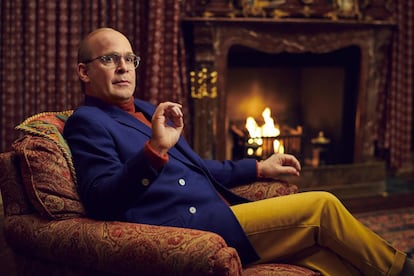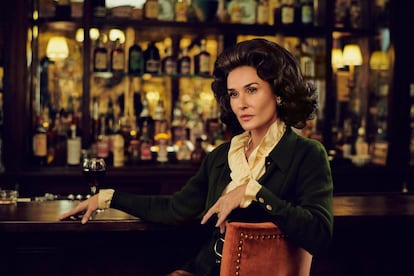‘Feud: Capote vs. The Swans’: The rise and fall of an ugly duckling
Tom Hollander and Naomi Watts lead Ryan Murphy’s exquisite miniseries, which tries to explain why the author of ‘In Cold Blood’ betrayed his supposed best friends

During a most elegant dinner, Louisa Firth (Roya Shanks), a lady of the highest class, tells Truman Capote, the writer, who at that time (1968) was very famous and respected – the success of In Cold Blood had filled his bank account with zeros and turned him into a sort of object of social desire among the rich – that she could never trust a writer. Amused, Capote (Tom Hollander in a state of grace that makes him the best on-screen Capote of all time) replies that neither does he, but he is curious to hear her reasons. Firth, without hesitation, tells him that narrators always have the last word, but they should not. Who, then? “Anyone who lived through World War II will tell you. The one who has the most power. The United States, for example. It had the last word. Two bombs and it’s over,” she says, and adds, subtly and brutally: “Kaboom.”
That scene from Feud: Capote vs. The Swans (the first four episodes now available on Hulu), the miniseries by the always brilliant and admirable Ryan Murphy – here accompanied by none other than by Gus Van Sant and Jennifer Lynch, in the direction, and Jon Robin Baitz in the script – perfectly summarizes the kind of feast that we can expect as viewers: once upon a time there was an ugly, repellently charming duckling, doomed to end up being devoured by his sisters, the lavish swans, when they find out that he is not one of them, and he never really was. They were just pretending, everyone. The writer, for the social ascent that it implied; the swans, for the amusement, and a bought understanding.

These swans are headed by Babe Paley (a masterful Naomi Watts), the wife of Bill Paley, the owner of CBS, whom Capote’s betrayal completely destroys, not so much because of what it does to her socially – he reveals her husband’s latest fling and plunges her into the misery of meek cuckold wives – but for what she loses with it: him. Not her husband, but the writer, with whom she thought she had something special, a mix of best friend and perfect man, funny, attentive, quite a bit wicked when it came to gossip, a bond she had never experienced with anyone else. Babe, and the rest of the enviable ladies of the New York jet set of the time (the late 1960s and early 1970s) who had embraced the writer as one would embrace a court jester — he is the teller of stories, and the stories are gossip, and they thrived on gossip — believing him to be mere entertainment, don’t hesitate to crush him when they discover that he thought he had the right to have what Louisa Firth referred to as “the last word.”
Capote had become a successful author after publishing In Cold Blood, the first non-fiction novel in history, a work halfway between journalism and literature that reconstructed the virulent murder of a family, the Clutters, in their home in the small town of Holcomb, Kansas. His editor, Joseph M. Fox, signed him a check for $300,000 so he could write his next novel comfortably; Capote claimed to have in mind his own version of In Search of Lost Time, one in which the gossip of that high society to which he had access would be put on display. It was going to be a real bomb, he said. But was he actually writing? No. He said he had written, and asked for more money. The publisher even advanced him $1 million. Under pressure, in 1975 he published a couple of chapters in Esquire magazine. One of them, titled La Côte Basque, 1965, in honor of the restaurant where he used to meet with Babe and the rest, his swans, blew everything up.

Anna Woodward, a former showgirl married to another of those tycoons — played amazingly, in just one scene, by Demi Moore — killed herself with cyanide after reading it (the published text revealed that she had shot and killed her husband). The disdain with which he spoke of the goings-on of the others — a very large group, portrayed by a group of divas: CZ Guest (Chloë Sevigny), the muse of Warhol and Dalí; Slim Keith (Diane Lane), Jackie Kennedy’s little sister; Lee Radziwill (Calista Flockhart) – drove his so-called friends (were they ever really friends?) to ostracize him. He had played with fire and was burned to death. His life was ruined. He died dethroned and drunk in 1984, a victim of an ostracism that proved unbearable for someone who lived off narrating other people’s lives.
Murphy turned this gruesome, venomous battle into an interpretive feast, as dreamy and enjoyable as the camera — always attentive to the textures of the satin, under an incitingly hypnotic dim light — allows. The series also reflects on what has been lost — or never had — at the top: authentic life, or loyalty and honesty. And what is even more interesting, the ultimate reason for Capote’s attack: the poor boy whose gift for telling stories took to the top, where he found the opportunity to avenge his mother (a providential Jessica Lange), whom these types of women always despised. A revenge that brings a twist to the tale of the ugly duckling, whose rise and fall are narrated here and who was never really accepted, but who had the last word and was ultimately crushed by the power of the swans. The unfinished Answered Prayers (barely three chapters completed) remains as battered proof.
Sign up for our weekly newsletter to get more English-language news coverage from EL PAÍS USA Edition
Tu suscripción se está usando en otro dispositivo
¿Quieres añadir otro usuario a tu suscripción?
Si continúas leyendo en este dispositivo, no se podrá leer en el otro.
FlechaTu suscripción se está usando en otro dispositivo y solo puedes acceder a EL PAÍS desde un dispositivo a la vez.
Si quieres compartir tu cuenta, cambia tu suscripción a la modalidad Premium, así podrás añadir otro usuario. Cada uno accederá con su propia cuenta de email, lo que os permitirá personalizar vuestra experiencia en EL PAÍS.
¿Tienes una suscripción de empresa? Accede aquí para contratar más cuentas.
En el caso de no saber quién está usando tu cuenta, te recomendamos cambiar tu contraseña aquí.
Si decides continuar compartiendo tu cuenta, este mensaje se mostrará en tu dispositivo y en el de la otra persona que está usando tu cuenta de forma indefinida, afectando a tu experiencia de lectura. Puedes consultar aquí los términos y condiciones de la suscripción digital.









































